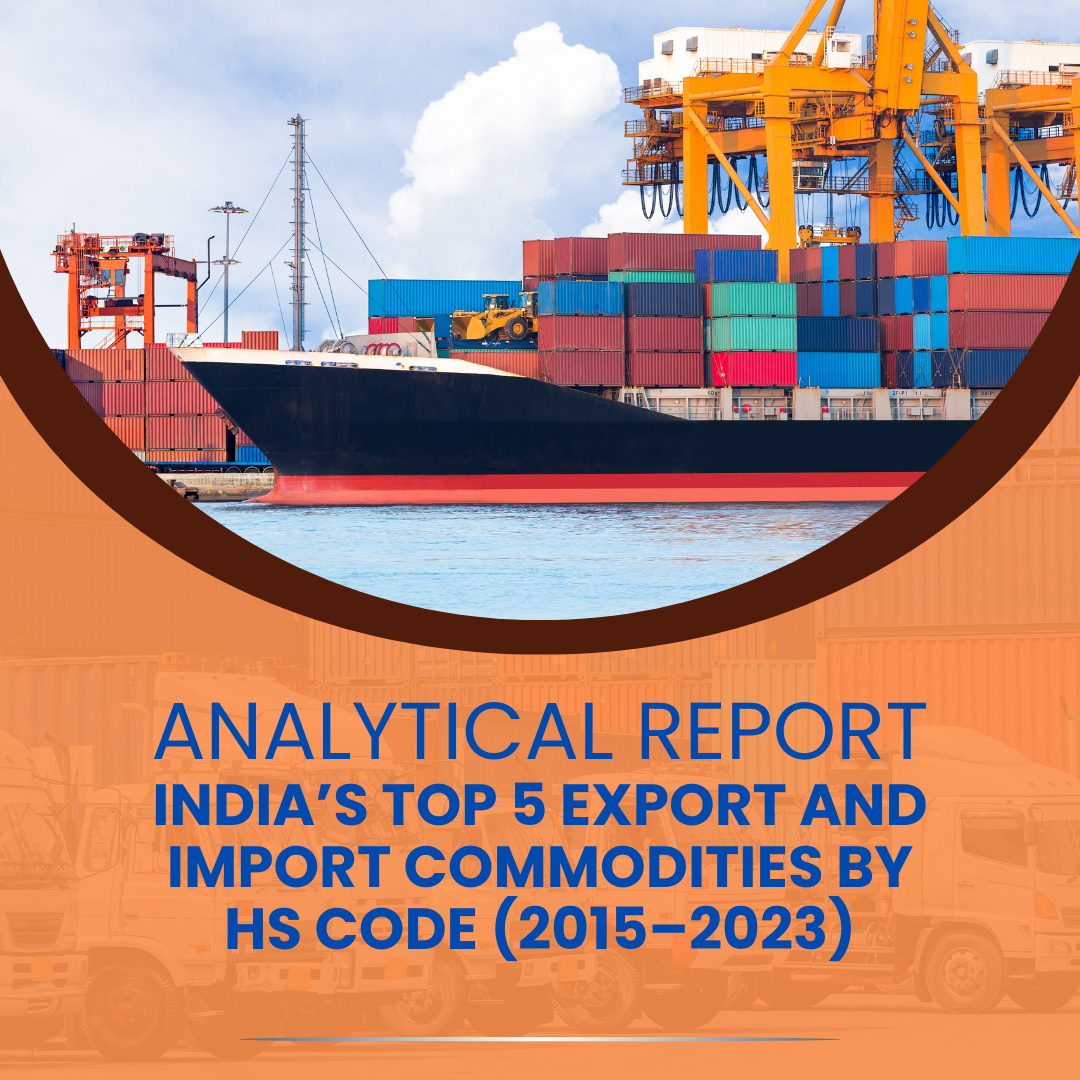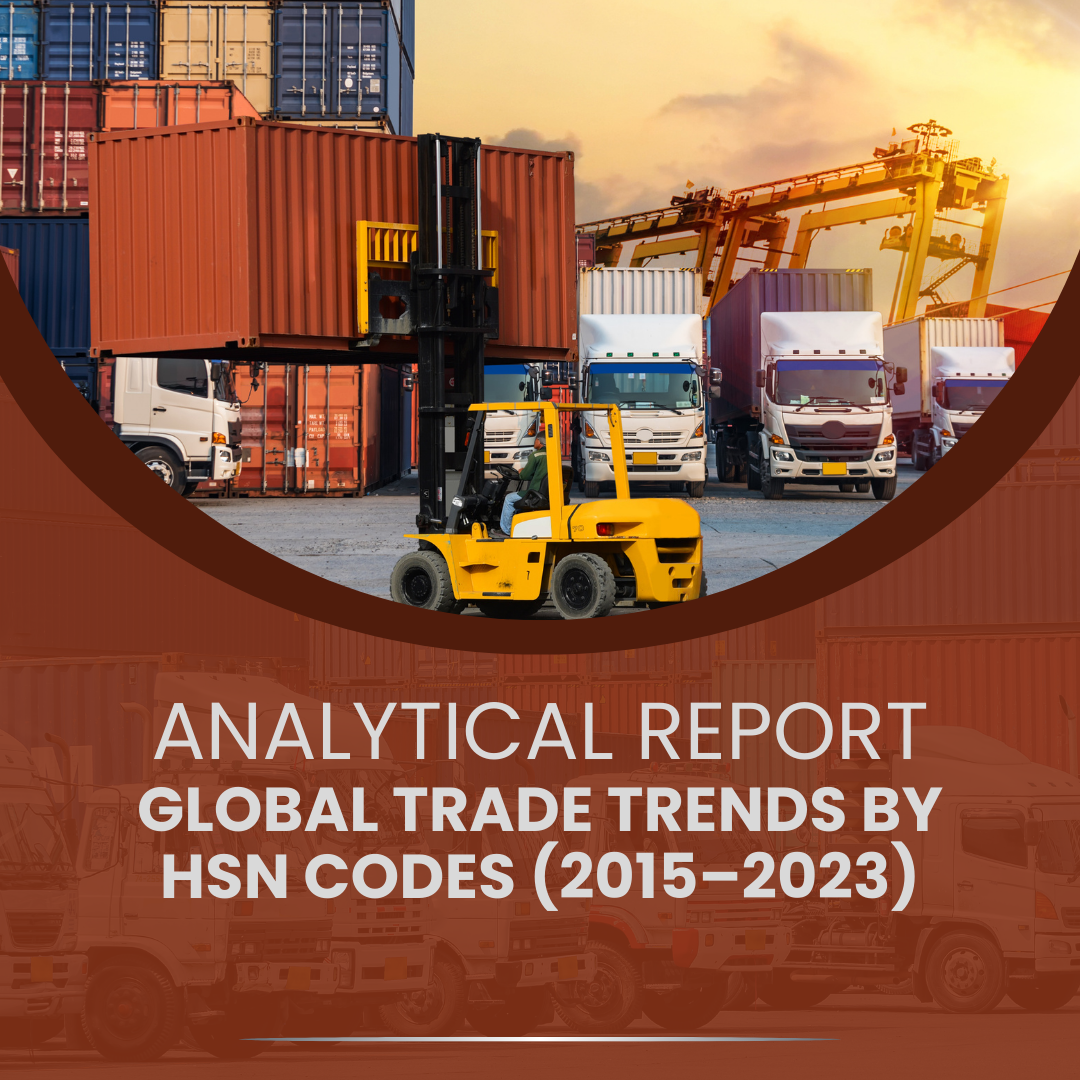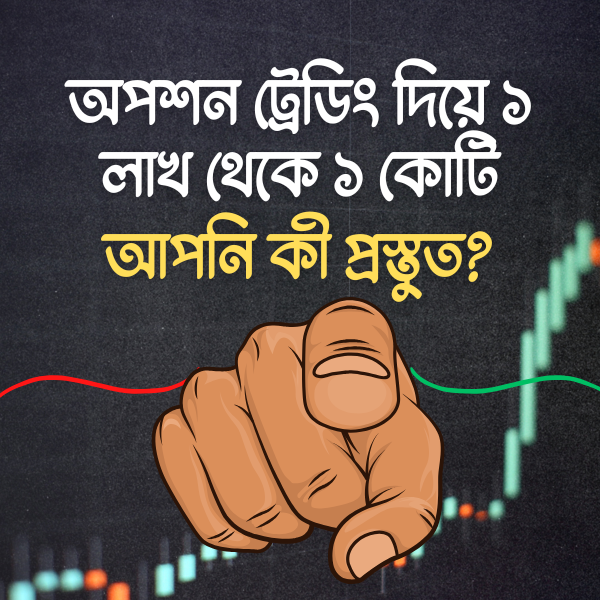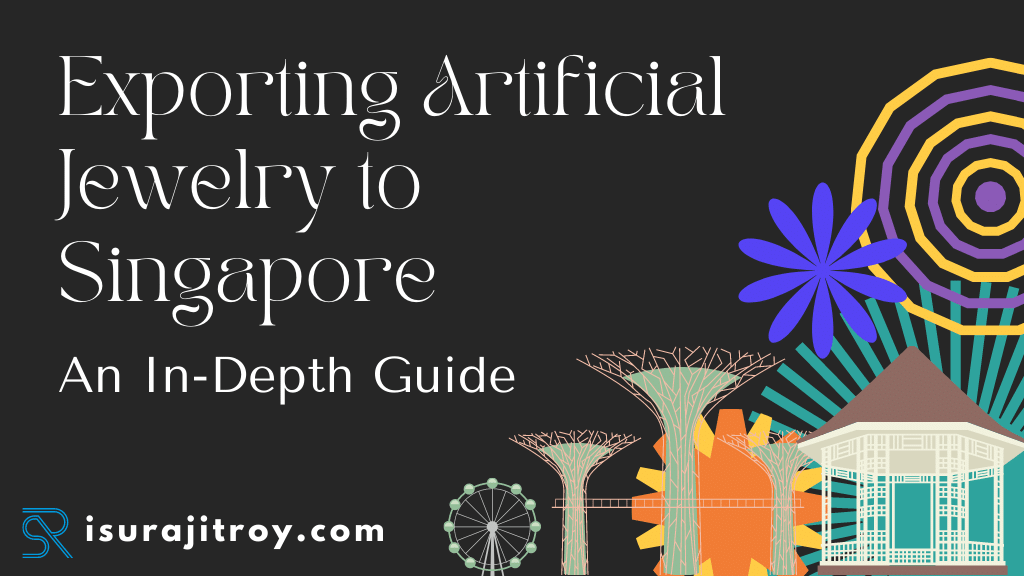
Exporting artificial jewelry to Singapore can be a profitable business venture for those in the fashion industry. Jewellery can be sold and distributed in Singapore, which is recognised for its love of fashion and beauty products. Before entering, you must understand the market, competition, and target market. This guide aims to provide detailed information and insights into the Singaporean jewelry market, along with the benefits of exporting artificial jewelry to this region.
Table of Contents
Definition of Artificial Jewelry.
Artificial jewelry, also known as costume jewelry, is jewelry made of non-precious metals, stones, and materials. This jewellery matches a specific outfit and costs as much as gold, silver, and valuable stones.
The Importance of Exporting Artificial Jewelry to Singapore.
Singapore is a hub for fashion and beauty products, making it an ideal location for exporting artificial jewelry. Consumers are continually searching for the newest jewellery trends as the market is constantly expanding. Moreover, Singapore is home to various cultures and ethnicities, and jewelry is a crucial aspect of their traditional attire. Therefore, there is a huge demand for artificial jewelry in Singapore, providing ample opportunities for exporters.
Overview of the Singaporean Jewelry Market.
The jewellery industry in Singapore is quite competitive, and there are many national and international brands available. Singaporeans have a high spending power, and they are willing to invest in high-quality and unique jewelry pieces. Necklaces, earrings, bracelets, and rings are available. Singaporeans also prefer jewelry made of precious and semi-precious stones, and they appreciate craftsmanship and intricate designs.
Market Research.
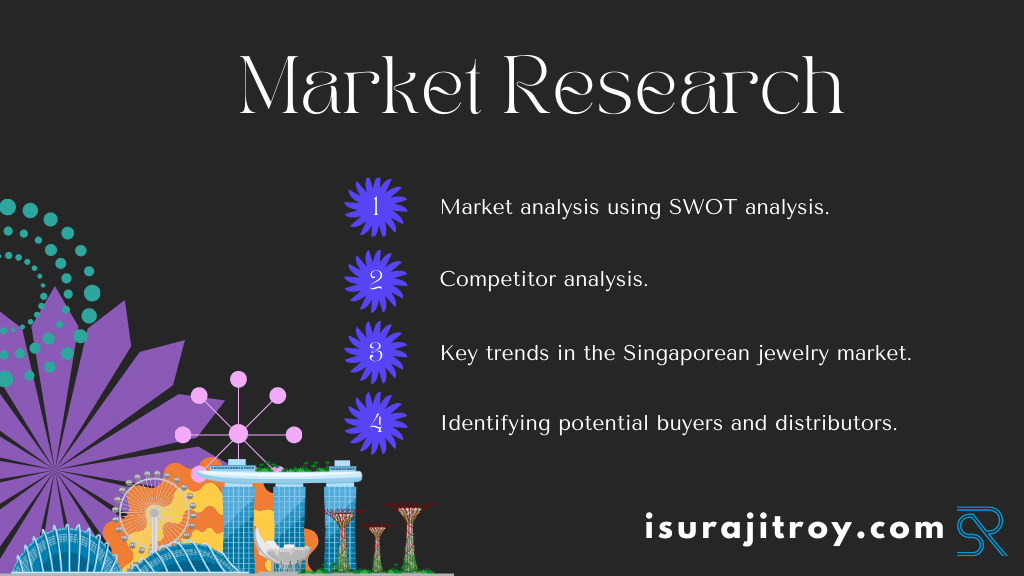
As with any successful business venture, market research is crucial when it comes to exporting artificial jewelry to Singapore. By conducting thorough research, exporters can determine the viability of their product in the Singaporean market and identify key competitors and potential buyers. In this section, we will discuss various aspects of market research, including market analysis using SWOT analysis, competitor analysis, consumer behavior and preferences, key trends in the Singaporean jewelry market, and identifying potential buyers and distributors.
Market analysis using SWOT analysis.
A SWOT analysis is a strategic tool used to evaluate the strengths, weaknesses, opportunities, and threats of a business or product. In the case of exporting artificial jewelry to Singapore, a SWOT analysis can help identify the unique selling points of the product, potential challenges in the market, and areas where the product can be improved to better meet the needs of the target market.
Strengths:
- Unique designs and styles of artificial jewelry can differentiate from local competition.
- Lower cost compared to authentic jewelry.
- Wide range of designs to choose from.
Weaknesses:
- Artificial jewelry may not be as durable or long-lasting as authentic jewelry.
- Perceptions of lower quality compared to authentic jewelry.
- Cultural differences may impact acceptance of certain designs.
Opportunities:
- Growing demand for fashion accessories in Singapore.
- Increasing preference for affordable fashion options.
- E-commerce platforms offer access to a wider audience.
Threats:
- Strong competition from local jewelry manufacturers and retailers.
- High tariffs and import taxes on foreign products.
- Cultural differences may impact acceptance of certain designs.
Competitor analysis.
Competitor analysis evaluates current and potential competitors’ strengths and weaknesses. By analyzing the competition, exporters can identify areas where their product can differentiate and stand out in the market.
In Singapore, the jewelry market is dominated by local retailers and manufacturers. Some of the key players in the market include Poh Heng Jewellery, Lee Hwa Jewellery, and Goldheart Jewelry. These retailers offer a wide range of jewelry options, including both authentic and artificial jewelry. However, there is also a growing demand for affordable fashion accessories, creating a potential opportunity for foreign exporters of artificial jewelry.
Key trends in the Singaporean jewelry market.
To succeed in exporting artificial jewelry to Singapore, it is important to stay up-to-date on the latest trends in the market. Some of the key trends in the Singaporean jewelry market include:
Personalization:
Consumers in Singapore are increasingly seeking personalized jewelry, including customized designs and engraved pieces.
Minimalist designs:
Minimalist and simple designs are gaining popularity in Singapore, particularly among younger generations.
Sustainable and ethical options:
Consumers are becoming more conscious of the impact of their purchases on the environment and human rights. Offering sustainable and ethical options can be a key selling point for exporters.
Identifying potential buyers and distributors.
Identifying potential buyers and distributors is crucial to the success of exporting artificial jewelry to Singapore. Some potential buyers and distributors to consider include:
- Online marketplaces: Platforms such as Lazada and Shopee offer access to a wide audience and can be a cost-effective way to sell products in Singapore.
- Fashion retailers: Retailers such as Zara, H&M, and Uniqlo have a strong presence in Singapore and may be interested in adding affordable fashion accessories to their product offerings.
- Tourist markets: Singapore is a popular tourist destination, and there may be opportunities to sell artificial jewelry to tourists looking for affordable souvenirs.
Legal Requirements for Exporting Artificial Jewelry to Singapore.
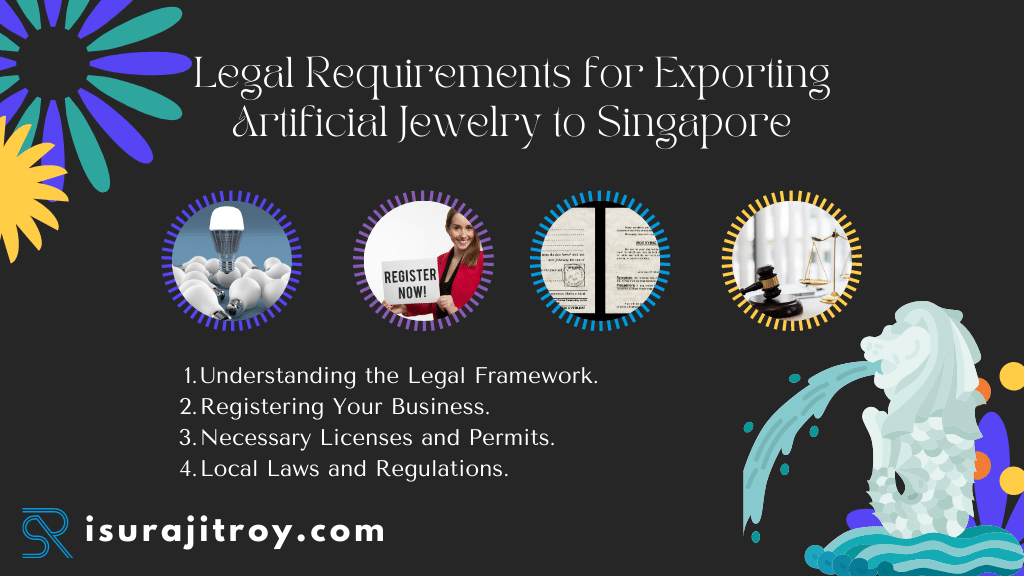
As a growing market for jewelry, Singapore has become an attractive destination for businesses looking to export artificial jewelry. However, before you can start exporting your products to Singapore, it’s important to understand the legal requirements and regulations governing the import of artificial jewelry.
Understanding the Legal Framework for Importing Artificial Jewelry to Singapore.
Singapore has strict laws regulating the import and sale of jewelry. Artificial jewelry is regulated under the Consumer Protection (Safety Requirements) Regulations (CPSR), which is enforced by the Consumer Protection Department of Enterprise Singapore. These regulations require that all artificial jewelry sold in Singapore meet specific safety standards.
Artificial jewellery must not contain risky materials like lead, cadmium, mercury, or nickel in order to be compliant with the CPSR. Jewellery materials must be safe. Additionally, the CPSR requires that all jewelry sold in Singapore be marked with a quality mark or stamp to ensure traceability and authenticity.
Registering Your Business with the Relevant Authorities.
Before exporting artificial jewelry to Singapore, you must register your business with the Accounting and Corporate Regulatory Authority (ACRA). ACRA is the national regulator of business entities and public accountants in Singapore. Registration is mandatory for all businesses operating in Singapore, including foreign businesses.
Your business name, address, directors, and shareholders must be provided during registration. You will also need to appoint a local resident as your company secretary and provide their details.
Obtaining the Necessary Licenses and Permits.
In addition to registering your business with ACRA, you will also need to obtain the necessary licenses and permits to import artificial jewelry into Singapore. Importing products of different types and quantities may require different licences.
For instance, if you are importing artificial jewelry for commercial purposes, you will need to obtain a TradeNet permit from the Singapore Customs. The permit allows you to clear your goods through customs and pay the necessary duties and taxes.
If your artificial jewellery incorporates gold or silver, the Singapore government’s Precious Stones and Precious Metals (Prevention of Money Laundering and Terrorism Financing) Act may require a dealer licence.
Compliance with Local Laws and Regulations.
To ensure compliance with local laws and regulations, it’s important to work with a reputable customs broker or freight forwarder who can help you navigate the complex regulatory landscape.
Make sure your items fulfil Singaporean government safety and quality regulations. This includes ensuring that your products are properly labeled with quality marks or stamps and that they do not contain any hazardous substances.
Logistics and Shipping
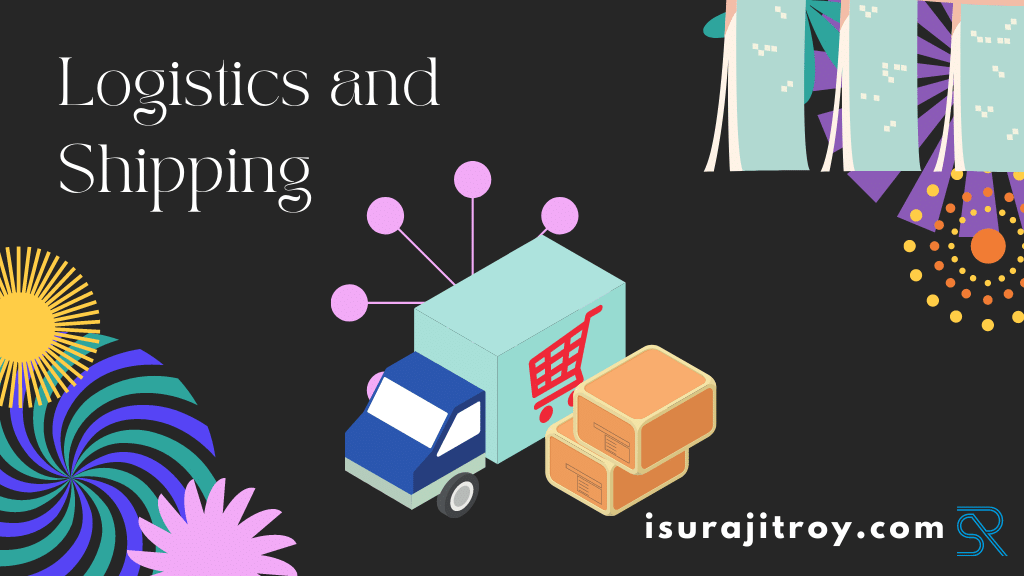
The exportation of artificial jewellery to Singapore presents a promising avenue for profitable business ventures. Prior to commencing the task, it is crucial to have a comprehensive comprehension of the logistics and shipping prerequisites implicated. This guide offers a comprehensive overview of the essential factors to consider when exporting artificial jewellery to Singapore.
Choosing a Reliable Freight Forwarder.
The selection of an appropriate goods forwarder is of utmost importance in guaranteeing the secure and effective transportation of your artificial jewellery. A proficient goods forwarder possesses extensive expertise in managing consignments of varying magnitudes and is well-versed with the statutory norms that govern the import of commodities into Singapore.
When choosing a goods forwarder, it is crucial to take into account their reputation, level of expertise, and the extent of their carrier network. It is advisable to inquire about the logistics provider’s historical performance in meeting delivery deadlines, as well as their capacity to furnish up-to-the-minute information regarding the progress of your consignment.
Transportation Methods
There are several transportation methods to consider when shipping your artificial jewelry to Singapore. These include air freight, sea freight, and road freight.
Air freight is the fastest option and is typically used for time-sensitive shipments. Sea freight, on the other hand, is slower but more cost-effective, making it a popular choice for larger shipments. Road freight is generally only used for shipments originating from Malaysia or Indonesia.
When choosing a transportation method, it is important to consider factors such as the size and weight of your shipment, the delivery timeframe, and your budget.
Packaging and Labeling Requirements.
The appropriate packaging and labelling of your imitation jewellery is crucial to guaranteeing its safe arrival in Singapore. It is recommended to utilise robust packaging materials that are capable of enduring the demanding conditions of transportation.
Proper labelling of your shipment is crucial, including accurate address information and any necessary markings, such as “fragile” or “handle with care.” Non-compliance with packaging and labelling regulations may lead to customs delaying or rejecting your shipment.
Customs Clearance Procedures.
Customs clearance is a mandatory requirement for your shipment to be released into Singapore. The process entails furnishing the requisite paperwork and settling all relevant taxes and duties.
For a seamless customs clearance process, it is advisable to collaborate closely with your goods forwarder and furnish all necessary documentation promptly. The documentation required may comprise of commercial invoices, packing lists, and certificates of origin.
Insurance Considerations.
Transporting your artificial jewelry involves inherent risks, such as damage or loss during transportation. To protect your investment, it is important to consider purchasing insurance for your shipment.
There are several types of insurance available, including marine cargo insurance and freight insurance. Marine cargo insurance covers loss or damage to your shipment while it is in transit, while freight insurance covers loss or damage to your shipment as well as any associated costs, such as customs duties and transportation costs.
Marketing and Sales Strategies for Exporting Artificial Jewelry to Singapore.
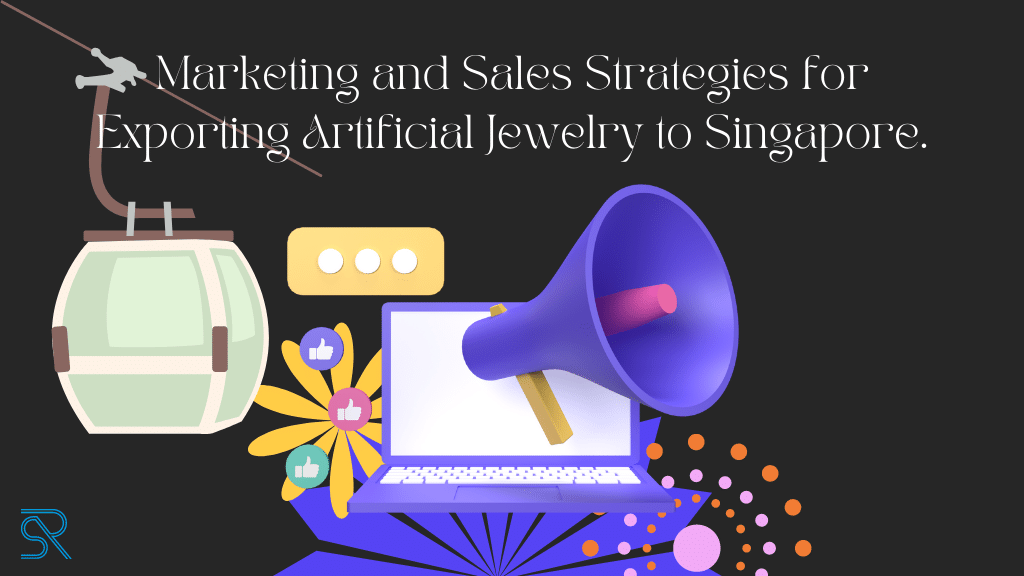
Venturing into a new market can pose significant challenges for businesses. When exporting artificial jewellery to Singapore, it is important to take into account specific factors. The implementation of a comprehensive marketing and sales strategy is crucial for achieving success in today’s fiercely competitive market. The present discourse aims to expound on several pivotal tactics that can be employed to establish your brand and enhance your sales in Singapore.
Developing a Marketing Strategy for the Singaporean Market.
Prior to commencing marketing activities in Singapore, it is imperative to have a comprehensive understanding of the market and your intended consumer demographic. Conduct thorough research on the cultural norms, demographic characteristics, and consumer behaviour prevalent in the local market to devise a marketing strategy that effectively connects with your target audience. It is important to take into account the following essential aspects:
Identify the target audience:
Comprehending your target audience is a pivotal aspect of formulating a triumphant marketing strategy. The primary demographic for artificial jewellery in Singapore comprises women aged 18 to 45 years.
Define your brand:
A well-defined brand can set you apart from your competitors. Develop a brand image that reflects your products’ quality and style.
Identify your unique selling points:
Determine what sets your artificial jewelry apart from other brands in the market. It could be the quality of your products, unique designs, or affordable pricing.
Use social media:
Social media platforms such as Instagram, Facebook, and Twitter are popular in Singapore. Leverage these platforms to promote your products and engage with potential customers.
Leverage influencers:
Collaborating with influencers can help you reach a wider audience and increase your brand awareness.
Adapting Your Product to the Singaporean Market.
To succeed in the Singaporean market, you need to adapt your product to the local market’s needs and preferences. Here are some key points to consider:
- Design: The design of your artificial jewelry should be simple, elegant, and trendy. Singaporeans prefer delicate and minimalist jewelry designs.
- Materials: The quality of materials used in your artificial jewelry is crucial. Use high-quality materials such as gold, silver, and platinum to ensure the longevity of your products.
- Price: Pricing is an important factor in the Singaporean market. Conduct market research to determine the average price of similar products and set your prices competitively.
- Packaging: Packaging plays a vital role in the purchase decision of customers. Invest in quality packaging that is aesthetically pleasing and reflective of your brand image.
Pricing Strategies.
In addition to setting competitive prices, there are other pricing strategies you can use to increase your sales. Here are some key strategies:
- Discounts and promotions: Offer discounts and promotions to attract new customers and retain existing ones.
- Bundle deals: Offer bundle deals to encourage customers to purchase multiple products.
- Loyalty programs: Implement a loyalty program to reward loyal customers and encourage repeat purchases.
Identifying Potential Sales Channels.
To increase your sales, you need to identify potential sales channels in Singapore. Here are some key channels to consider:
- Online marketplaces: Online marketplaces such as Qoo10, Lazada, and Shopee are popular in Singapore. List your products on these platforms to reach a wider audience.
- Brick-and-mortar stores: Partner with brick-and-mortar stores that specialize in selling artificial jewelry.
- Pop-up stores: Participate in pop-up stores to showcase your products and reach potential customers.
Building Relationships with Buyers and Distributors.
Building relationships with buyers and distributors is crucial for expanding your business in Singapore. Here are some key points to consider:
- Attend trade shows: Attend trade shows and events to meet potential buyers and distributors.
- Networking: Networking is important in the business world. Attend networking events and conferences to meet potential partners.
- Establish a local presence: Establish a local presence in Singapore to build trust with your customers and partners.
Understanding Cultural Considerations for Exporting Artificial Jewellery to Singapore.
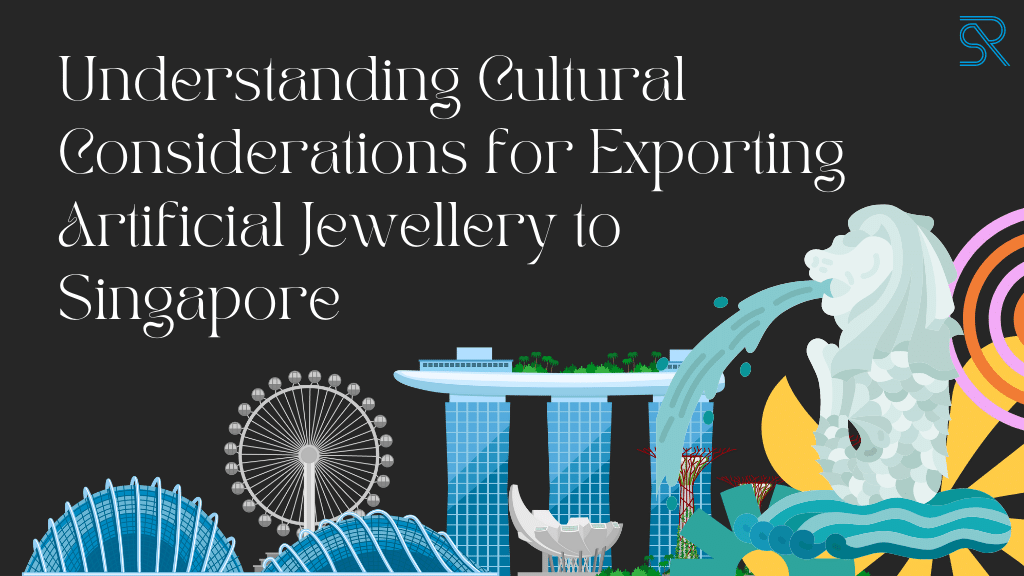
As you plan to export artificial jewellery to Singapore, it is essential to understand and respect the cultural norms and values of the country. Singapore is a multicultural society with a diverse population, and understanding the cultural nuances can make or break your business deal. In this article, we will discuss the critical cultural considerations to keep in mind when exporting artificial jewellery to Singapore.
Understanding Cultural Norms and Values in Singapore.
Singapore is a culturally diverse city-state, characterised by a fusion of Chinese, Malay, Indian, and Western traditions. The society in question places a high premium on the virtues of politeness, respect, and harmony. The people of Singapore are renowned for their adherence to punctuality, with tardiness being viewed as a sign of disrespect towards others. In the context of conducting business in Singapore, it is imperative to exhibit a high level of preparedness and timeliness for meetings.
Singapore is renowned for its stringent regulations, and it is imperative to comply with them. The act of chewing gum is prohibited by law in Singapore, while smoking is strictly prohibited in public areas. Furthermore, the citizens of Singapore attach significant significance to maintaining cleanliness, and any act of littering can lead to substantial penalties. It is imperative that you adhere to the applicable laws and regulations in your locality to prevent any legal complications.
Cultural Differences in Business Practices.
Singaporean society is structured hierarchically, and the establishment of business connections is predicated on deference to authority and seniority. It is customary to utilise an individual’s professional title, such as “Director” or “Manager,” when addressing them. In Singaporean culture, there is a strong emphasis on personal relationships and a preference for conducting business with individuals who are familiar and trustworthy. Establishing strong relationships with business partners and clients is imperative for achieving success in the Singaporean market.
In the context of Singapore, the negotiation process may exhibit a protracted duration compared to other nations, thereby necessitating the virtues of perseverance and forbearance. The Singaporean culture places great importance on consensus and compromise, and negotiations are typically conducted with a focus on achieving mutually beneficial outcomes. Active listening and a willingness to compromise are essential components for achieving a mutually beneficial resolution during a negotiation.
Building Relationships with Potential Clients and Partners.
Building a relationship with potential clients and partners is critical to success in the Singaporean market. It is essential to show genuine interest in your business partners and learn about their culture and values. Singaporeans value politeness and respect, and it is essential to show these qualities in your interactions with them.
Networking is an essential aspect of doing business in Singapore. Attending business events and trade shows can provide opportunities to meet potential clients and partners. It is also beneficial to join business associations and clubs to expand your network.
Developing a Culturally Sensitive Marketing Strategy.
The development of a culturally sensitive marketing strategy is imperative for achieving success in the Singaporean market. It is imperative to comprehend the cultural values and preferences of your intended audience and modify your marketing tactics correspondingly.
Singaporean consumers prioritise quality and authenticity, and tend to gravitate towards products that are skillfully made and possess distinctive features. Emphasising the superior quality and exquisite craftsmanship of your artificial jewellery can effectively capture the attention of Singaporean consumers. In Singapore, social status holds significant importance, and leveraging influencers or celebrity endorsements can prove to be a highly efficacious marketing tactic.
In marketing material development, it is imperative to steer clear of any language or imagery that may be deemed offensive. Utilising suitable colour schemes in your marketing materials is a crucial aspect to consider. In Chinese culture, the colour red is traditionally associated with good fortune and luck. Therefore, incorporating this colour into marketing strategies can be an effective way to appeal to Chinese consumers.
FAQ: Frequently Asked Questions.
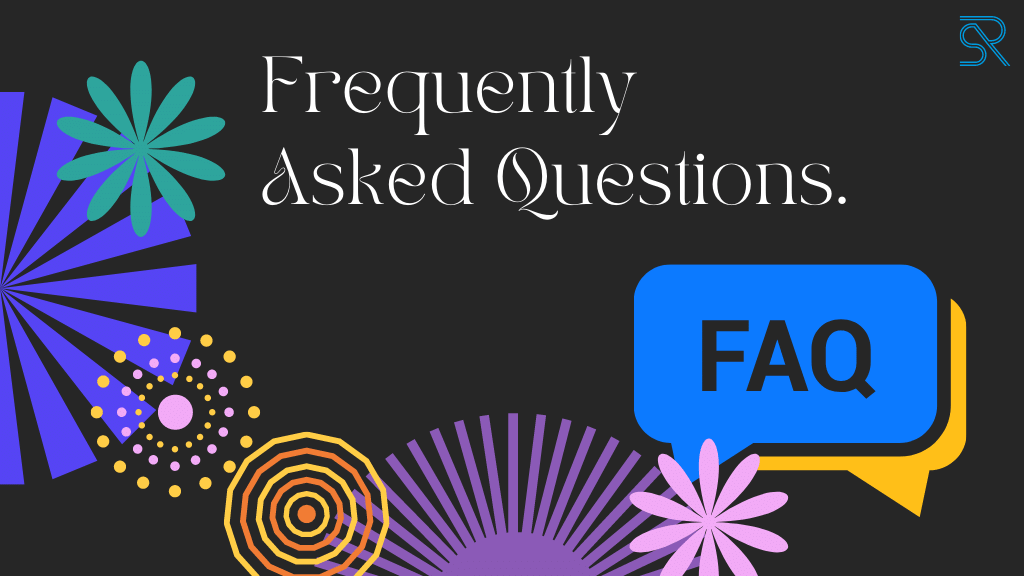
Here are some frequently asked questions about exporting artificial jewelry to Singapore.
FAQs: Exporting Artificial Jewelry to Singapore
1. What is the demand for artificial jewelry in Singapore?
The Singaporean market exhibits a significant appetite for jewellery, including the artificial variety. The proliferation of fast fashion has led to a growing demand among consumers for cost-effective and fashionable accessories that can be worn on a regular basis. Artificial jewellery is a cost-effective alternative to natural jewellery that offers the added benefit of being highly customizable to align with current fashion trends.
2. What legal requirements should I be aware of when exporting to Singapore?
Before exporting to Singapore, it’s important to be aware of the country’s import regulations. To ensure smooth clearance of your products through customs, you will need to provide the necessary documentation, including a customs declaration, a commercial invoice, and a packing list. You will also need to ensure that your products comply with Singapore’s safety and quality standards.
3. How do I find potential buyers and distributors?
To initiate the process of identifying potential buyers and distributors, it is recommended to conduct comprehensive market research to identify the key players in the Singaporean jewellery market. It is recommended to participate in industry events and trade shows to establish connections with potential buyers and distributors. Additionally, social media platforms can be utilised to effectively engage with potential partners. It is advisable to contemplate collaborating with a nearby agent or distributor who possesses pre-existing connections with buyers and distributors within the market.
4. What are the key trends in the Singaporean jewelry market?
The jewellery industry has witnessed a surge in demand for sustainable and ethically-sourced products in recent times. The trend of conscientious consumption is on the rise in Singapore, with consumers displaying a heightened awareness of the ecological and societal implications of their purchases. As a result, they are willing to pay a higher price for products that are in line with their ethical principles. Additional noteworthy developments in the market encompass bespoke tailoring and individualised styling, alongside the incorporation of non-traditional elements and avant-garde aesthetics.
5. How do I adapt my product to the Singaporean market?
In order to successfully tailor your product for the Singaporean market, it is crucial to have a comprehensive understanding of the cultural preferences and stylistic sensibilities of the local consumer base. It is advisable to incorporate traditional motifs and design elements that are currently in demand in the market, while also providing a diverse range of options that cater to varying tastes and styles when customising your products. It may be necessary to make adjustments to your pricing strategy in order to maintain competitiveness within the local market.
6. How do I build relationships with potential clients and partners?
Building relationships with potential clients and partners in Singapore requires a proactive and personalized approach. Start by identifying key decision-makers in your target companies and reaching out to them with a compelling value proposition. Attend industry events and trade shows to network with potential partners, and follow up with personalized communications to nurture those relationships over time. Consider offering samples or trial products to demonstrate the quality and value of your offerings.
7. What are the best marketing strategies for the Singaporean market?
The best marketing strategies for the Singaporean market will depend on your target audience and the unique value proposition of your products. However, some effective strategies may include leveraging social media platforms to showcase your products and engage with potential customers, investing in search engine optimization (SEO) and pay-per-click (PPC) advertising to drive traffic to your website, and collaborating with influencers or bloggers who have a strong following in the market.
8. What are the common mistakes to avoid when exporting to Singapore?
When exporting to Singapore, some common mistakes to avoid include failing to comply with the country’s import regulations, underestimating the competition in the market, and neglecting to build strong relationships with potential clients and partners. It’s also important to conduct thorough market research to ensure that your products are well-suited to the local market, and to have a solid understanding of the cultural nuances and business practices in Singapore.
Conclusion
Exporting to Singapore can present a profitable opportunity, however, it necessitates meticulous planning and contemplation of various factors. Conducting thorough research and gaining a comprehensive understanding of the local market is crucial prior to market entry. Establishing strong relationships with potential buyers and distributors is a critical component for achieving success.
Compliance with all legal requirements and regulations is essential to ensure a seamless export process. It is essential to have a comprehensive understanding of customs regulations, tax policies, and labelling requirements.
In addition, the development of a culturally sensitive marketing strategy is of utmost importance. To effectively market in Singapore, it is crucial to have a deep understanding of the cultural norms and values of the society and to customise your marketing strategies accordingly. In order to establish strong connections with potential clients and partners, it is essential to have a comprehensive comprehension of the disparities in business practises that exist between your country of origin and Singapore.
Download The Importer’s Data.
Data Sheet
